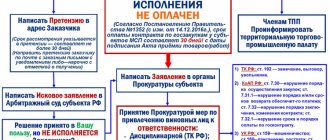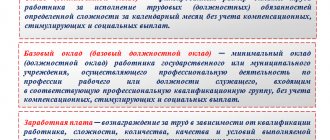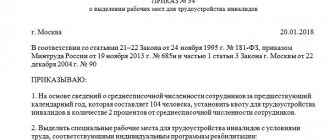- On 09.27.2018 0 Comments 223-FZ, 44-FZ, EIS, Request for quotations, Request for proposals, Competition, SMP, Special account, Articles, Electronic auction, ETP
We continue to talk about amendments to procurement legislation that will come into force or have already come into force in 2021. Today we will talk about changes for customers under 223-FZ regarding purchases from small and medium-sized businesses (SMEs). They were introduced by Law No. 505-FZ of December 31, 2021, as well as by Government resolutions.
Electronic form
Procurements that are organized exclusively for SMEs will have to be carried out strictly electronically . This provision will be enshrined in Part 2 of Article 3 of Law 223-FZ and will come into force on July 1, 2021.
From the same date, a new article 3.4 will appear in the law, which will regulate the conduct of electronic procedures for SMEs. In particular, there is a limited list of ways to determine a supplier, namely:
Registration in ERUZ EIS
From January 1, 2021, in order to participate in tenders under 44-FZ, 223-FZ and 615-PP, registration in the ERUZ register (Unified Register of Procurement Participants) on the EIS (Unified Information System) portal in the field of procurement zakupki.gov.ru is required.
We provide a service for registration in the ERUZ in the EIS:
- competition in electronic form;
- auction in electronic form;
- request for quotes in electronic form;
- request for proposals in electronic form.
Customers under 223-FZ will not be able to choose a different method for determining a supplier for procurement from SMEs.
Bidding for small and medium-sized businesses must be held on electronic trading platforms that meet the requirements of Law 44-FZ and additional requirements provided by the government. The list of federal sites where it will be possible to carry out procedures for SMEs under 223-FZ will be additionally approved.
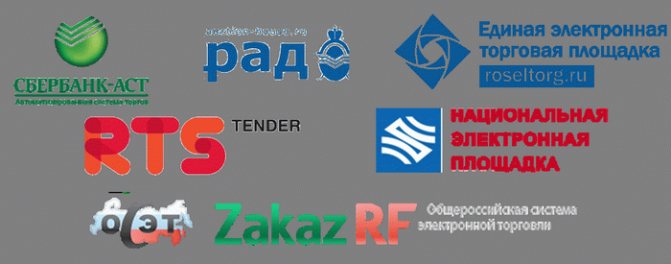
ETPs where trading is held under 44-FZ
In addition, the new Article 3.4 will spell out the specifics of each procedure, including:
- procedure and timing;
- price restrictions;
- application rules;
- the procedure for securing the application (for example, if it is secured with money, then the funds must be deposited into a special bank account from the list determined by the Government in accordance with Law 44-FZ).
In case of violations committed by the customer under 223-FZ, including failure to purchase from SMEs , he is subject to punishment in the form of the obligation to apply the provisions of law 44-FZ. The amendments clarify that in this case the customer must apply the provisions of Law 44-FZ, which are expressly specified in 223-FZ (Part 8.1 of Article 3, which will appear in 223-FZ from July 1, 2021).
New purchase volume
The total volume of purchases that customers under 223-FZ must make from SMEs remains at the same level. This is 18% of the annual volume. But the volume of direct purchases from SMEs, that is, those that are carried out exclusively among such entities, has changed. Until January 1 of this year, in accordance with Government Decree No. 1352, it was 10%.
At the beginning of 2021, a new resolution No. 819 of August 19, 2021 came into force. So, in accordance with it, the volume of purchases intended exclusively for SMEs increased from 10 to 15% .
Responsibility for non-payment under 223-FZ
The procedure for mutual settlements is prescribed in the contract. Any non-payment under contract 223-FZ entails liability in the form of monetary compensation:
- Payment of contractual penalties is monetary liability for late fulfillment of obligations, which the counterparty calculates for each day of delay.
- Legal costs - if the counterparty sues and wins, all of its legal costs will fall on the losing customer.
IMPORTANT!
On January 2, 2021, the law on fines for late payments under a contract or a separate stage to small businesses came into force - Federal Law No. 454 of December 22, 2020. Now the fine for violating the deadline for payment of emergency medical services under 223-FZ will be (Part 9 of Article 7.32.3 of the Code of Administrative Offenses of the Russian Federation):
- for officials - from 30,000 to 50,000 rubles;
- for legal entities - from 50,000 to 100,000 rubles.
Who should purchase from SMEs?

In accordance with Resolution No. 1383 of November 15, 2021, the list of categories of customers who must enter into contracts with small and medium-sized businesses in the amount of 18% of the total annual procurement volume has expanded since January 1. Now these are three types of organizations:
- customers whose annual revenue is more than 500 million rubles;
- customers, including credit institutions, whose assets exceed 500 million rubles, provided that they themselves do not belong to the category of SMEs;
- autonomous institutions that in the previous year made purchases (meaning concluded contracts) in the amount of more than 250 million rubles.
Changes in procurement from SMEs in 2021 under Law No. 223-FZ
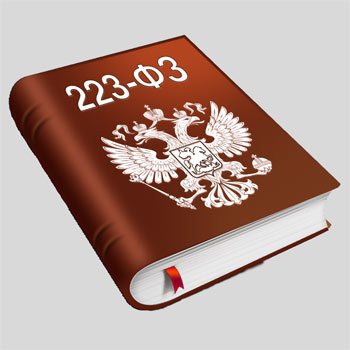
We offer you an overview of changes affecting small and medium-sized businesses in 2021, which will be introduced to the legislation on public procurement under Law No. 223-FZ
New criteria for selecting customers who should purchase from small and medium-sized entrepreneurs
In accordance with the provisions of Law No. 223 (amendments were made to government decree No. 1352 of December 11, 2014), the purchase of products from NSR entities from January 1, 2018 (the volume of purchases placed for the year from NSR entities must be at least 18 percent of the annual the total volume of contracts in value terms, and the size of concluded contracts is not less than 10% of the total cost of all contracts) customer organizations must carry out:
- legal entities whose annual revenue for the previous year (calendar) amounted to more than 500 million rubles;
- credit organizations, as well as legal entities under Law No. 223, whose assets for the previous year (calendar) exceeded 500 million rubles.
This requirement will not apply if such a customer is himself a medium and small business entity, except for an autonomous institution whose total value of contracts concluded based on the results of purchases of goods for the previous year (calendar) amounted to more than 250 million rubles.
Control over purchases from SMEs
1. The criteria that must be followed when assessing the compliance of draft procurement plans with draft amendments to these plans have been changed (changes to government decree No. 1169 of October 29, 2015, come into force from March 1, 2018):
- The total value of customer contracts concluded based on the results of the purchase of goods for the previous year (calendar) must be more than 1 billion rubles. Here we are talking about the customers listed in Resolution No. 1169 (clause 3, subclause “a”).
- The total cost of contracts concluded by the customer based on the procurement results for the previous year (calendar) must be more than 50 million rubles. Here we are talking about government customers listed in Resolution No. 1169 (clause 3, subclause “b”).
- The value of assets or annual revenue of a credit institution or customer for the previous year (calendar) must be more than 500 million rubles. At the same time, the list includes customers operating under Law No. 223, state companies created under Law No. 223, whose annual revenue is no more than 500 million rubles, customers specified in Resolution No. 1352 (paragraphs 6 and 8, paragraph 2), legal entities operating under Law No. 223 and having an annual revenue of more than 500 million rubles, legal entities operating under Law No. 223 and credit organizations whose assets are more than 500 million rubles.
Exception: customers-subjects of the SMP, except for an autonomous institution, the total cost of contracts for which based on the results of procurement for the previous year (calendar) amounted to more than 250 million rubles.
2. Monitoring of compliance with schedules and changes to schedules will be carried out in relation to the following customers (in accordance with changes to government decree No. 1383 of November 15, 2021, coming into force on June 1, 2017):
- Federal autonomous institutions and customers with a total volume of contracts concluded for the previous year (calendar) from 250 million to 1 billion rubles. Here we are talking about government customers listed in Resolution No. 1169 (clause 3, subclause “b”).
- Subsidiary business companies, more than 50 percent of the authorized capital of which belongs to state-owned companies created in accordance with Law No. 223.
- Subsidiary business companies, more than 50 percent of the authorized capital of which belongs to subsidiaries.
- Autonomous institutions and customers whose annual revenue or asset value for the previous year (calendar) is more than 10 billion rubles. Here we are talking about government customers listed in Resolution No. 1169 (clause 3, subclause “b”).
- Customers whose contracts based on procurement results for the previous year (calendar) were concluded in an amount less than 50 million rubles. Here we are talking about government customers listed in Resolution No. 1169 (clause 3, subclause “b”).
Tags : changes, Law No. 223,
November 28, 2017
Number of views: 3425
Please rate how useful this material was.
Rating: 5/5 — 2 votes
Similar articles:
- Regulations have been approved for checking delivered goods using both video and photographic equipment for compliance with the information under the contract (562)
- FAS RF: when conducting a repeat procurement in the field of construction, the participant will only need to submit “consent” to participate (493)
- The Russian Armed Forces figured out from what date to count the limitation period when changing the price of a government contract (473)
Comments ()
Write a comment
Changing the report on purchases from SMEs
From 2021, the report on purchases from small and medium-sized businesses has received a new form. What exactly has changed?
- Information on contracts for each category of SMEs is now indicated separately.
- Agreements concluded for a period of more than 5 years constitute a separate category.
- The number of contracts that were paid for in the current year, but will be executed after its end, is separately indicated.
We remind you that the report on purchases from SMEs made in 2017 must be published in the Unified Information System before February 1, 2018 .
Read briefly about other changes to 223-FZ that will come into force in 2018 in this material.
Status of a small and medium-sized enterprise, features, reporting.
The corporate procurement market is a tasty morsel of the contract system, which has long been inaccessible to small and medium-sized businesses. Special government customers chose more serious suppliers for their tenders, and 223-FZ did not greatly limit them in this. However, in May 2013, the Government of the Russian Federation issued Decree No. 867-r, designed to expand access for small and medium-sized businesses (SMEs) to procurement by monopolies and companies with state participation.
The action plan involves removing barriers to the participation of small and medium-sized businesses in tenders under 223-FZ and increasing the share of purchases from SMEs. The norms affected only certain government customers listed in Government Decree No. 1352. The resolution also regulates the annual volume of purchases from SMEs, the specifics of their implementation and reporting requirements.
In accordance with Federal Law 209-FZ “On the development of small and medium-sized enterprises in the Russian Federation,” SMEs are legal entities and individual entrepreneurs related to micro, small and medium-sized enterprises according to the following criteria:
1. For legal entities:
- The share of state and municipal participation, as well as the participation of religious, charitable organizations and foreign capital in the authorized capital does not exceed 25%.
- The share owned by one or more legal entities that are not SMEs does not exceed 25%. The requirement does not apply to companies engaged in programming, database development and other technological products, the exclusive rights to which belong to their founders - budgetary and autonomous scientific institutions.
- The average number of personnel for the previous calendar year is: up to 15 people for micro-enterprises; 15-100 people for small businesses; 101-250 for medium-sized enterprises.
- Revenue excluding VAT or book value of assets for the previous calendar year does not exceed: 60 million rubles for micro-enterprises; 400 million for small businesses; 1000 million for medium enterprises.
A document confirming the status of a small and medium-sized enterprise is a declaration, the form of which is in the appendix to Resolution No. 1352. Since 2021, the Federal Tax Service has been maintaining a register of SMEs, so an extract from it can also serve as confirmation of status.
Which customers are required to purchase from SMP in 2018
From January 1, 2021, the obligation to conclude contracts with small and medium-sized businesses under 223-FZ is assigned to customers, referred to in the law as “individuals”:
- Companies with annual revenue for the previous calendar year exceeding 2 billion rubles. Moreover, it is the indicator of revenue from the sale of goods/works/services that is taken into account – that is, the company’s own profit. And, for example, government subsidies are not counted as revenue - these are “other income.”
- State companies created on the basis of federal law (for example, Avtodor Group of Companies).
In addition to “individual” customers, the law provides for “specific” customers:
Features of procurement under 223-FZ from SMP
If the initial price of a procurement contract is less than 50 million rubles, the customer is obliged to conduct it among small and medium-sized businesses. If more, it can attract any suppliers.
The law does not limit customers in choosing the type of tenders: goods/works/services can be purchased from medium-sized businesses both on a competitive basis and in the form of procurement from a single supplier. You can also choose the share of participation of SMP in the tender:
- Any suppliers, including SMEs, take part in the procurement.
- Purchasing only among SMEs.
- Procurement with the obligatory condition of involving small and medium-sized businesses as subcontractors.
In total, for “individual” customers, the volume of purchases from SMP for the year should be 18% in value terms. The share of purchases among SMP alone is 10%. At the same time, some specific types of goods, works and services that cannot be produced by SMEs are not included in the customer’s annual purchase volume.
For example, services of educational organizations. “Specific” customers are required to purchase innovative and high-tech products from SMP in the amount of 5% of the annual purchase volume.
For failure to fulfill procurement obligations from SMEs, customers will face penalties. Part 8.1 of Article 3 of Federal Law 223-FZ, which entered into force in January 2017, provides for punishment for this in the form of transferring the customer to procurement under 44-FZ during the next calendar year, starting on February 1.
If you are interested in purchasing from SMP, then the expanded version of the Synaps.Pro tender search will help you distinguish them from the crowd thanks to the appropriate settings.
Report on the volume of purchases from SMP
- Every month, all government customers prepare a report on the number and total cost of contracts concluded with SMEs - clause 4 of part 19 of article 4 of Federal Law 223-FZ.
- Every year, “individual” customers draw up a report on the purchase of goods, works, services from SMEs and publish it in the Unified Information System - Part 21 of Article 4 of Federal Law 223-FZ. The form of the report on the volume of purchases from SMP is approved by Resolution No. 1352.
- Every year, “specific” customers who are obliged to purchase innovative products from SMP additionally generate a report on their purchases and publish it in the Unified Information System - Resolution No. 1442.
Test yourself by answering the questions:
1. The government customer’s income for the previous calendar year amounted to 2.5 billion rubles. Of this, 1 billion came in the form of government subsidies and is reflected in the balance sheet as “other income.” Is the customer obliged to make purchases from SMEs in the current year, and in what volume?
Yes, 18% - no, of the 2.5 billion in income, only 1.5 relates to the company's revenue. Those customers whose own revenue exceeds 2 billion are subject to the regulation.
Yes, 10% - we advise you to re-read the material again.
2. What awaits the customer purchasing under 223-FZ if during the calendar year he purchased products from small and medium-sized businesses in insufficient quantities?
A fine of up to 300 thousand rubles is incorrect, return to the chapter “Features of procurement under 223-FZ from SMP.”
For one calendar year, this customer will be required to follow 44-FZ - exactly that.
There is no obligation to purchase additional goods, works or services from SMEs to the required volume before February 1 of the next calendar year, re-read the chapter “Features of procurement under 223-FZ from SMEs”.
3. GC Avtodor makes a purchase for 300 thousand rubles. This purchase will be made:
Only among SMEs, since Avtodor Group of Companies refers to “individual” customers who have the obligation to purchase from SMP, and the initial contract price is less than 50 million rubles - that’s right!
Among an unlimited circle of people, since the Avtodor Group of Companies refers to “individual” customers who have the obligation to purchase from SMP, but the initial contract price is above 50 thousand rubles is incorrect, we advise you to read the article again.
Among an unlimited circle of persons, since the customer does not have the obligation to purchase from SMP - no, Avtodor Group of Companies refers to “individual” customers, who, starting from 2021, are entrusted with the obligation to make purchases from SMP in a certain volume provided for by the Law.
How is payment made?
223-FZ regulates the procurement activities of certain categories of legal entities: state corporations and budgetary institutions with extra-budgetary income. These purchases are carried out according to the rules established by the organization. The customer determines the payment procedure under 223-FZ by the procurement regulations - an internal document of the organization adopted for more detailed regulation of the procurement process, since 223-FZ itself establishes only general, basic rules.
The procurement regulations provide requirements for how goods, works or services are paid for under contracts. For example:
- payment schedule for the supply of goods under 223-FZ;
- admissibility of advance payment and its volume;
- possibility of staged payment.
There are no maximum terms for payment of the contract under 223-FZ. They are established by the procurement regulations.
An exception is made for purchases made among small businesses and the self-employed. The updated version of the Government of the Russian Federation Decree No. 1352 dated December 11, 2014 establishes special payment conditions for SMP under 223-FZ, including terms.
Use free instructions from ConsultantPlus experts to make purchases from self-employed entrepreneurs and self-employed people without errors or violations.
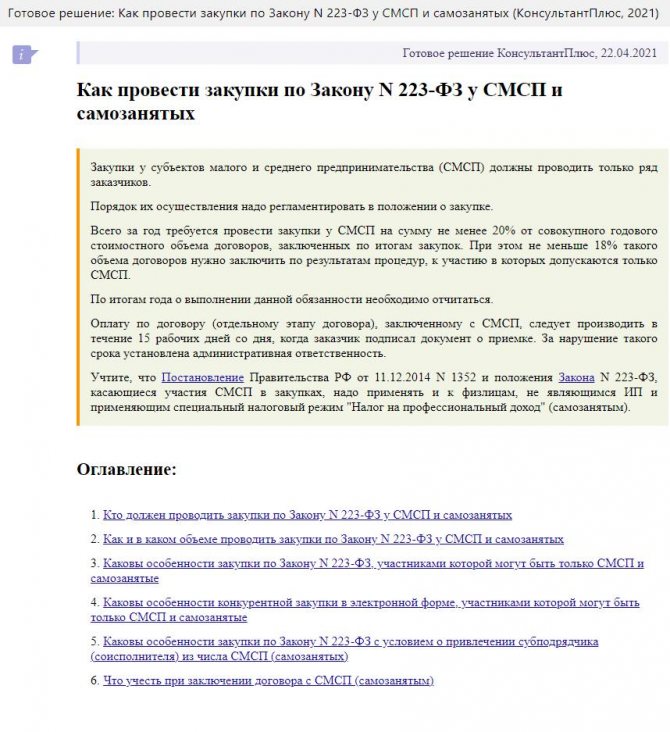
Clauses 14(3), 28 and 32(1) strictly stipulate 15 calendar or working days for payment for SMP under 223-FZ - the customer pays for the supplied goods, work and services within 15 working days after signing the acceptance documents with the small entity entrepreneurship or self-employed. Be sure to indicate this condition in the draft contract and notice. But if a small business representative and a self-employed person wins in a purchase organized for all participants (not only for small businesses), then you have the right to set a different deadline for the transfer of money in the terms of the contract (resolution of the Arbitration Court of the North-Western District No. F07-16068/2019 dated 21.02 .2020 in case No. A56-167042/2018, Volga-Vyatka District No. F01-2914/2018 dated 08/02/2018 in case No. A11-7390/2017).
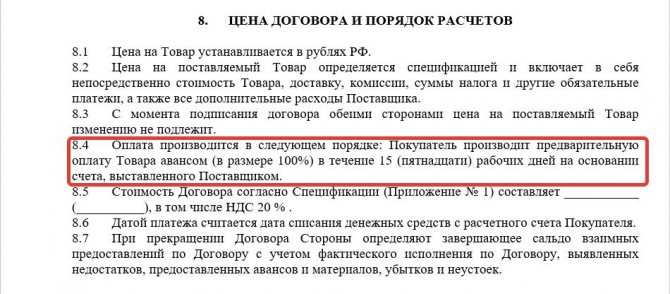
IMPORTANT!
The State Duma is considering a bill to amend 223-FZ. They want to set deadlines for transferring money under all contracts. It is proposed, by analogy with 44-FZ, to introduce a 30-day limit for transfers. This will limit abuses on the part of organizations that unreasonably extend the payment period.
In addition to resolving the issue of when payment is due under 223-FZ, it is necessary to stipulate in the procurement regulations and the agreement between the parties:
- what is the form of payment: will the money be transferred in non-cash form or paid in cash;
- procedure for payment of funds: is there an advance under the agreement and what percentage of the total amount of the agreement is it, is the agreement paid in stages or in a single payment upon completion of the entire scope of work;
- what is considered the moment of fulfillment of the company’s obligation: the moment of debiting funds from the account or the moment of crediting. The first option is more convenient because the customer is not responsible for delays in transfers caused by bank problems;
- when the customer is granted a deferred payment under 223-FZ in 2021. This is not regulated by law; the parties have the right to agree on mutually beneficial conditions and stipulate them in the contract.
What are the features of procurement from SMP for customers working under 223-FZ?
Olga Belyaeva
A question has arisen regarding small and medium-sized businesses. Nowhere can I find the answer to this question or regulatory confirmation for purchases up to 100 thousand rubles. according to Law No. 223-FZ. Let’s assume that the customer develops and approves a list according to the new OKPD classifier for 2021 in accordance with Decree of the Government of the Russian Federation dated December 11, 2014 No. 1352, and when conducting a purchase in the amount of up to 100 thousand rubles, which is not posted on the official website, but the purchase according to the nomenclature, this list of SM&SP will be included: 1) Will we be able to conclude an agreement as usual, regardless of the approved nomenclature for SM and SP? 2) Or we will have to announce mandatory purchases of up to 100 thousand rubles. What about small and medium-sized businesses? 3) Is it possible to make a note to this list that if this purchase does not exceed 100 thousand rubles, then the customer is not obliged to make such purchases from small and medium-sized businesses and post notices and documentation on the official website?
Answer: I will answer the questions in order. 1) You can purchase, but from SM and JV; 2) It is not necessary to announce competitive procurement; 3) No, you can’t.
Purchases from SMP under Federal Law 223
Prepayment from the customer under 223-FZ can even reach 100%
Payment under the agreement is carried out strictly within a period of 5 to 15 days
The amount of application security for SMiSP has been reduced to 2%
- home
- Assistance in bidding and tenders
- Purchases from SMP under Federal Law 223
Small and medium-sized businesses are companies that meet certain criteria (revenue, number of employees, etc., Article 4 of Federal Law No. 209-FZ of July 24, 2007). Such companies are abbreviated as: SMiSP, SMP, SSP. In this article we will use the abbreviation SMiSP.
Part 8 of Article 4 of Law 223 Federal Law enshrines the right of the Government of the Russian Federation to establish the specifics of the participation of small and medium-sized businesses (hereinafter referred to as SMB) in procurement carried out by individual customers, the annual volume of purchases that these customers are required to make from such entities, the procedure for calculating the specified volume, and also the form of the annual procurement report from SMP and the requirements for the content of this report.
Also implemented was the Decree of the Government of the Russian Federation dated December 11, 2014 No. 1352 “On the specifics of the participation of small and medium-sized businesses in the procurement of goods, works, and services of certain types of legal entities”
The regulation stipulates that the annual volume of purchases of certain categories of customers from small and medium-sized businesses (hereinafter referred to as SMEs) must be at least 18% of the total annual value of contracts concluded as a result of procurement. At the same time, the total cost of contracts concluded as a result of procurement, in which only SMEs can be participants, must be at least 10% of the total annual volume (clause 5 of the Regulations).
Since it is easier for many large companies to pay a fine than to comply with the procurement standard from SMP, 223-FZ has introduced a rather strict measure: if the customer does not comply with the procurement standard from SMP (or posts false information about the annual volume of purchases from SMP or does not post information at all), then his procurement regulations will be recognized as unplaced and from February 1 to the end of the year, he will have to conduct procurement in accordance with 44-FZ (from 01/01/2016: part 8.1. Article 3 of Law 223-FZ).
Result in numbers:
100%
is the size of the maximum advance payment for commercial purchases for SMEs
Experts from the Entrepreneurship Support Center, having studied all existing programs to support small businesses, using accumulated experience and close interaction with various government agencies, have developed a unique scheme of work for comprehensive support of government and commercial tenders for small businesses, under the terms of which you will receive profitable contracts with advance payment and with all possible benefits, as well as minimal costs!
And we will help you realize the idea of your dreams!
The main advantages of procurement by SMEs under 223-FZ
The Federal Law applies the designation of SMEs - “Small and Medium Enterprises”. The legislation does not approve the format for the participation of small businesses in competitive selections, but there is Government Decree No. 1352, which defines the conditions of such tenders. The work under this resolution is regulated by the Joint Stock Company “Federal Corporation for the Development of Small and Medium Enterprises”.
Purchasing conditions have been approved: if a corporation’s income is more than 2 billion rubles, then from 2021 such companies are required to allocate tenders and purchases from a single supplier to SMEs for no less than 18% of the annual volume of transactions. The organization approves in its regulations on procurement activities OKPD2 all goods, works and services that will be purchased as part of support from SMEs. If the contract value is less than 50 million rubles, the customer must hold a tender for SMEs. In order to receive
If the organization does not place the required number of tenders for SMEs and does not publish data about this or publishes incorrect information, then from February 1 until the end of the calendar year the customer will have to place contracts within the framework of 44-FZ, and it is known to be much stricter - this will entail huge financial losses.
The types of tenders are determined by the organization itself in its regulations on procurement activities. A small enterprise can participate in a tender or purchase from a single supplier, as well as enter an auction with the condition of attracting SMEs for subcontracting.
To submit documentation for the tender, as well as under 44-FZ, suppliers attach a declaration of conformity with the SMP. And since 2017, an extract from the Federal Tax Service from the new Unified Register of Small Business Enterprises has been provided.
Result in numbers:
18%
All customers are required to purchase from small businesses under Federal Law 223
Benefits for tenders for small businesses within the framework of Federal Law 223:
- Advance payments for purchases are approved from 30% to 100%;
- Payment terms for completed work are strictly from 5 to 15 days;
- The amount of application security cannot be more than 2%;
- Contract enforcement is often lacking;
- Large competing companies cannot apply for tenders;
- Partnership program with additional benefits and the opportunity to work without a tender.
And we will find you suitable tenders and direct contracts!
Requirements for procurement from small businesses under Federal Law 223
As part of fulfilling the requirements of federal law and the small business development program, all customers are required to carry out the following actions:
- Calculate the total annual volume of purchases from SMP;
- Develop and approve a List of goods, works, services, the purchase of which will be carried out from SMP, and publish it in the Unified Information System. Such a list is necessary for the customer to select a 10% purchase volume from SMP. If there is no list, the customer does not have the right to purchase from small and medium-sized businesses;
- Approve the Procurement Plan from SMP and SSP, which includes GWS from the List of GWS for purchase exclusively from SMP and SSP (clause 5 (1) of the Government of the Russian Federation No. 1352). Let us recall that until the end of 2015, the customer did not have the obligation to separately reflect in the Procurement Plan those purchases that he would carry out among small and medium-sized businesses;
- Within the calendar year, purchase 18% from SMP, and 10% of them, according to the Purchasing Plan, exclusively from small and medium-sized businesses;
- Publish the report no later than 02/01/2017. If the customer does not select the established volume of purchases from SMP and does not post the report within the specified period, then in 2021 the procurement regulations are considered not posted. After February 2021, such a customer will have to make purchases according to the rules of 44-FZ, losing the benefits under 223-FZ.
Purchases from SMP can be carried out in any way and in any form. In order to comply with the standard, RF PP 1352 provides for 3 mechanisms.
- Firstly, in 18% it is possible to include contracts concluded with SMP, which won the procurement carried out among all suppliers (for example, a regular procurement was announced, and SMP won it);
- Secondly, procurement, the participants of which can only be SMP. These are competitive procurements for which a list of goods, works, and services is approved (see below). Agreements based on the results of these purchases fall into the standard of 10% of purchases only from SMP;
- Thirdly, contracts concluded by participants (executors, contractors) with co-executors from among the SMP are used to meet the standard. That is, contracts concluded as a result of procurement, in which there was a requirement for the winner that in order to fulfill the contract he must attract subcontractors from among the SMP. Such agreements also fall into the total number of agreements concluded with SMP (18%).
Since it is easier for many large companies to pay a fine than to comply with the procurement standard from SMP, 223-FZ has introduced a rather strict measure: if the customer does not comply with the procurement standard from SMP (or posts false information about the annual volume of purchases from SMP or does not post information at all), then his procurement regulations will be recognized as unplaced and from February 1 to the end of the year, he will have to conduct procurement in accordance with 44-FZ (from 01/01/2016: part 8.1. Article 3 of Law 223-FZ).
And we will check whether your company is suitable for working on preferential terms!
Last changes
On 02/11/2021, a draft government decree was published on the website of draft regulations, which amends government decree No. 1352 of 12/11/2014 on the specifics of the participation of small and medium-sized businesses in tenders under 223-FZ.
The Ministry of Finance plans to change clause 8 of this resolution and oblige customers to approve the list of goods, works, and services for all purchases among small and medium-sized businesses under clauses. “b” clause 4 of government resolution No. 1352. The current version of this paragraph provides for the obligation to approve this list for bidding and other procurement methods that are provided for in the regulations on procurement among SMEs under paragraphs. “b” clause 4 of resolution No. 1352.
Read more: “How to work with the list of goods for small and medium-sized enterprises.”
The new version of this paragraph still does not exclude the purchase of goods, works, and services included in such a list from any persons, including not from small and medium-sized businesses.
In addition, they plan to amend clause 18 of Government Resolution No. 1352 and oblige customers to purchase goods, works, and services from small businesses from the list based on the results of tenders with an initial maximum contract price of up to 800 million rubles. In the current version, this amount is 200 million rubles.
And clause 19 of resolution No. 1352 is planned to be declared invalid. Now this clause provides for the customer’s right to purchase goods, works, and services from the list from SMEs based on the results of tenders with NMCD from 200 million rubles. up to 400 million rubles.
IMPORTANT!
The changes are planned to come into force on 10/01/2021.
The explanatory note states that the purpose of the changes is to increase the opportunity for small and medium-sized businesses to participate in tenders under 223-FZ.
Let us recall that now a quota has been established for state-owned companies on purchases from SMEs. Last year, the government increased it from 18% to 20% of the total annual value of contracts of state-owned companies. The customer's payment period under the contract was reduced from 30 to 15 working days. In 2021, administrative liability was introduced for violation of payment deadlines. Read more: “Global reform of 223-FZ: what has changed since 01/01/2021.”
| on changing PP No. 1352 |
Let us remind you that from April 1, 2021, Federal Law No. 452-FZ of December 22, 2020 comes into force, which will change the features of competitive electronic procurement among SMEs under 223-FZ. Read more: “We conduct competitive procurement under 223-FZ: changes from 2021.”
Due to recent changes, the article has become irrelevant!
We are already updating it and will republish it soon. To understand the new rules right now, use free access to ConsultantPlus materials.
Get free for 2 days

